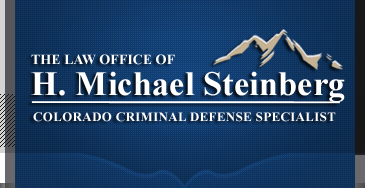






Why You Cannot Trust Your Lawyer With Incriminating Evidence – Colorado Criminal Law
By H. Michael Steinberg Denver Colorado Criminal Defense Lawyer – Attorney
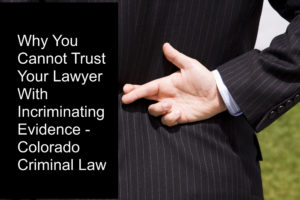 Why You Cannot Trust Your Lawyer With Incriminating Evidence – Colorado Criminal Law – There are important rules – a Code – that controls the conduct of your Colorado Criminal Defense Lawyer. While those charged with crimes in the criminal justice system cannot take the time to learn this complex code – it is critical to at least have a cursory understanding of certain basic conflicts that may arise between you and your lawyer.
Why You Cannot Trust Your Lawyer With Incriminating Evidence – Colorado Criminal Law – There are important rules – a Code – that controls the conduct of your Colorado Criminal Defense Lawyer. While those charged with crimes in the criminal justice system cannot take the time to learn this complex code – it is critical to at least have a cursory understanding of certain basic conflicts that may arise between you and your lawyer.
This brief article addresses one of those conflicts – commonly called the “hot potato” scenario. In a nutshell the ” hot potato” scenario involves the client giving his lawyer certain evidence of the crime with which he or she is charged…. the “hot potato.”
There are situations where a lawyer’s duty of client loyalty must give way to the need of the public to prosecute criminal cases coupled with the duty of the attorney as an officer of the court.
The “hot potato” scenario is one of these times.
Some Basic Foundations OfThe Criminal Defense Lawyer – Client Relationship
The Colorado Code of Professional Responsibility (the Code) requires a Colorado criminal defense lawyer not to:
“reveal a confidence or secret of his client,”.
A lawyer also cannot:
“[u]se a confidence or secret of his client to the disadvantage of the client.”
A ‘confidence’ refers to information protected by the attorney client privilege under applicable law.
A ‘secret’ refers to other information gained in the professional relationship that the client has requested be held inviolate or the disclosure of which would be embarrassing or would be likely to be detrimental to the client.
A lawyer also has a duty not to prejudice or damage his client during the course of the professional relationship.
The Need For Complete Trust Between A Criminal Defense Lawyer And The Client
What must be clear to every person who has hired a lawyer when they have been charged with a crime is this – to provide the most effective defense, there must be a full and fair disclosure to the lawyer of all the known facts.
That means the good facts and the bad.
A client will only reveal damaging information if that client has assurances that his lawyer is forbidden to reveal these disclosures — thus harming that client. This “privilege of confidentiality” establishes the necessary truth that must exist for the lawyer – client relationship to work and, in my opinion, is the most fundamental tenet of the adversary system.
If a lawyer were permitted to reveal damaging client communications:
“…the adversary process will be undermined and the lawyer will be deprived of his greatest obligation as an advocate “to present every defense that the law of the land permits. . . .”
“The purposes and necessities of the relation between a client and his attorney requires, the fullest and freest disclosures to the attorney of the client’s objectives, motives and acts behind the alleged criminal accusations.
Client disclosures must be made in the strictest confidence. This is a sacred trust upon which the criminal justice system is built.
Again, the law seems clear. It wisely declares that the attorney-client relationship is one of the most confidential of the professional privileges in our legal system:
“…. all confidential communications and disclosures, made by a client to his legal adviser for the purpose of obtaining his professional aid or advice, shall be strictly privileged;—that the attorney shall not be permitted, without the consent of his client,—and much less will he be compelled — to reveal or disclose communications made to him under such circumstances.”
But equally clear, (perhaps not to the client), is this…the attorney- client “privilege” protects only the communications of the client and all observations the attorney may have made as the result of the confidential communications of the client.
There are exceptions to the privilege that the lay client may not understand.
The Scenario – Client Wants To Give Incriminating Evidence Of A Crime To His Lawyer
Let’s say that a criminal defense lawyer comes into possession of the gun used by his client in the commission of an Aggravated (Armed) Robbery
Some Questions Are Raised In This Context:
What are the lawyer’s duties if the client gives him the gun and asks the lawyer to hold it for him?
What if the gun was given to the lawyer by a friend of the client without the client’s knowledge?
If the lawyer accepts the gun, must he turn it over to the police?, and if that is true – how can he do this without violating the attorney-client privilege and without incriminating his client?
What if we change the facts and posit that the client is under investigation for aggravated robbery and the client takes the lawyer to a hidden spot where the gun has been left? How does that change the lawyer’s obligations?
The Rub – The Duty To Keep Client Confidences vs The Duty Not To Tamper With Evidence
While a Colorado criminal defense lawyer owes the highest duty of confidentiality to his client, Colorado law provides for possible criminal charges if the lawyer conceals or otherwise tampers with physical evidence without notifying authorities and without legal right.
Retaining the gun in our hypothetical “hinders the prosecution” of the client and impairs the gun’s availability to the prosecutio. If a lawyer engages in this kind of conduct that lawyer is chargeable with the crime – Tampering With Evidence 18-8-610
Here is the law in Colorado on the subject of Tampering With Evidence
§ 18-8-610. Tampering with physical evidence
(1) A person commits tampering with physical evidence if, believing that an official proceeding is pending or about to be instituted and acting without legal right or authority, he:
(a) Destroys, mutilates, conceals, removes, or alters physical evidence with intent to impair its verity or availability in the pending or prospective official proceeding; or
(b) Knowingly makes, presents, or offers any false or altered physical evidence with intent that it be introduced in the pending or prospective official proceeding.
(2) “Physical evidence”, as used in this section, includes any article, object, document, record, or other thing of physical substance; except that “physical evidence” does not include a human body, part of a human body, or human remains subject to a violation of section 18-8-610.5.
(3) Tampering with physical evidence is a class 6 felony.
An Analysis Of The “Hot Potato” Fact Pattern
Some call the ethical dilemma confronting lawyers in these fact patterns the “hot potato” problem. To understand the dimensions of this dilemma and the competing ethical duties described in this article, one needs to look more closely at the law.
The Colorado Code Of Professional Responsibility – while seemingly clear on it’s face – actually offers your lawyer little or no guidance when that lawyer is confronted with the dilemma of what they must do with incriminating evidence obtained from the client.
The Code…
Fails to articulate a clear underlying ethical philosophy which helps to resolve the practitioner’s dilemma of prioritizing the duty of client loyalty and the duty to disclose in situations where they require contradictory conduct of the lawyer,
(and)
Fails to set forth clear standards other than the obvious (such as when the client intends to commit a crime – see below) which state when the law requires disclosure of a client secret or confidence.
The “hot potato” controversy must be resolved by solutions that provide real answers to what, at first, appears to be an irreconcilable conflict between the lawyer’s duty of loyalty to the client and the lawyer’s duty to aid in the truth-seeking process.
Some Simple Rules Lawyers Must Follow If They Receive A “Hot Potato”
Here are the rules lawyers must follow in the “hot potato” scenario:
The Rule:
If a lawyer accepts the possession of incriminating evidence (e.g. “the gun”) from his client, he or she must voluntarily turn it over to the authorities. In this context, the lawyer’s duty of client loyalty and the attorney-client privilege do not operate to protect the client or the lawyer from the required disclosure.
The Reasoning:
1. The right of the public to prosecute criminals and the obvious undesirability of having lawyers act as depositories of stolen items and contraband are paramount. Therefore, the acceptance of the gun by the lawyer, (or the acceptance of any incriminating physical evidence for that matter), requires affirmative disclosure to the Court.
2. The attorney-client privilege will not “cover” a lawyer’s failure to disclose this kind of physical evidence unless the physical evidence, was “created” in the course of a confidential communication made for the purpose of seeking legal advice.
3. The so called “administration of justice” will be effectively undermined if clients could give their lawyers incriminating evidence which the prosecution would be barred from obtaining.
Removing Evidence From The Scene Of A Crime
If incriminating evidence is removed from the scene of a crime by the accused and with the attorney, then the law requires the lawyer to reveal:
1. The details of where the physical item was found.
2. The original condition of the item and
3. Any defense testing of the item.
However, even with these strict disclosure requirements, the client’s communication to the lawyer and the lawyer’s observations made as a consequence of protected communications are STILL protected from disclosure to the Court. (But see crime fraud exception below).
Balancing Different Interests Means Your Lawyer May Have To At Least Partially Betray You
While the law requires a lawyer to make the disclosures above, it maintains a duty to protect the client’s identity and the source of communications from the client.
The balance that is struck between the public’s need to prosecute, (which madates disclosure), and the attorney-client privilege, (which affords the client freedom from fear of compulsory disclosure) requires the production of the evidence, but permits the lawyer the right to refuse to give the prosecution any confidences sourced from the client.
Once the incriminating evidence is surrendered to the Court, the attorney-client privilege engages and the lawyer is forbidden to reveal:
1. The client’s identity,
2. The client’s communications with respect to the incriminating evidence, and
3. All of the “lawyer’s observations made as a consequence of protected communications.”
As a pracical matter – to avoid surrendering the evidence to the Court and perhaps identifying the client by association with the lawyer, lawyers often choose another lawyer to make the required disclosure
What If The Incriminating Evidence Is Obtained From A Third Party Or Other Source Independent of Client?
If the so called “hot potato” (any incriminating evidence) is obtained independent of client communications, such as the situation where the gun is given to the criminal defense lawyer by a family member, the lawyer must not only voluntarily surrender the evidence, but he may also may be compelled to testify at trial concerning his source of the evidence.
The Courts have held that if the acquisition of the gun (again – any incriminating evidence) occurs outside of the protection afforded by the attorney-client privilege, the lawyer’s duty of disclosure as an officer of the court takes precedence over the lawyer’s duty of loyalty to the client not to reveal information detrimental to the client.
Again, in this twist, a lawyer must not only turn over the gun given him by the client’s family – the lawyer may be forced to testify concerning the circumstances of how he came to possess it.
Is There A “Duty to Advise” The Client to Surrender Incriminating Evidence NOT In The Possession Of The Lawyer
How does this problem work out in real life?
Consider this, the client tries to give incriminating physical evidence to his Colorado criminal defense lawyer. The lawyer, understanding his or her ethical duties, tells his client the evidence must be turned into the Court or to the police.
So… the client decides to keep the evidence – or he or she may further decide that the best course of action would be to destroy the incriminating evidence.
Under these facts, the law requires the lawyer to “urge” the client to permit the lawyer to surrender the evidence or, in the alternative, “urge” the client to surrender the evidence to the authorities himself.
Finally, if the evidence is not “on the person” of the client, the lawyer must urge the client to leave it where it is and then inform the authorities.
What is clear is this – it is unethical for the lawyer to advise the client to destroy the evidence as this may be construed as criminal “tampering with evidence” conduct.
While these are tough and complex if not agonizing situations – the choice for the lawyer between the potential loss of a single client and the loss of his or her license to practice law and possible criminal charges, is a clear choice.
The lawyer has the duty to choose between representing his client fully “within the bounds set by the law” or telling his client that this is now made impossible by the situation and that the client has the right to obtain another attorney if the client wishes.
The “Look But Don’t Touch” Rule In The “Hot Potato” Scenario
Another hypothetical is the “scene of the crime situation.” Here is the rule – if somehow incriminating evidence is removed from its location from the scene of the crime with the assistance of the attorney, then:
…the details of where the evidence was found, the original condition of the evidence and any defense testing results conducted upon the evidence must be voluntarily disclosed to authorities. These facts may be proved by the prosecution at trial.”
BUT a lawyer could make the very reasoned decision that there is also an ethical duty to remove the incriminating evidence for “defense testing”… such as testing a gun for fingerprints or DNA evidence.
Before disturbing the evidence, that is removing it for testing, the lawyer must make the “tactical decision” that if he or she removes the evidence, (not only the evidence, but the test results with the authorities regardless of the test’s outcome) how could that possibly impact the client’s case.
A lawyer takes on considerable risk if this decision is made without due diligence and great caution, – as the results of testing could damage the defense case.
On the other hand, the “look but not touch rule” means that the mere “viewing of the scene of the crime situation,” (without the seizure and or the testing of the potentially incriminating evidence), requires that the lawyer act to protect any information about physical evidence which has been communicated to the lawyer by the client.
In this context and there is no obligation for disclosure and this duty extends to all client secrets, which includes all statements of the client and any observations made by the lawyer as a result of these confidential communications.
In our gun hypothetical, if a lawyer is somehow given access to the scene of the crime, the lawyer may also not disclose the location of a hidden gun at that scene nor any pictures he took.
But, once again, if the lawyer removes the gun from the scene and runs tests on it, he or she ,must then voluntarily disclose the location of the gun, the original condition of the gun, and any test results.
Note this important point – any information as to how he discovered the gun or information linking the client to the gun is protected by the attorney-client privilege.
Understanding The Clearest Case For A Colorado Criminal Defense Lawyer – The Crime Fraud Exception To Confidentiality
As discussed in this article – while there are difficult questions that may arise in this area of competing duties of disclosure, one issue in this area of law is clearer and is not difficult to understand at all.
Lawyers may disclose clients’ confidences and secrets when:
“… required by law or court order”
and when the confidences or secrets indicate
“the intention of his client to commit a crime and the information necessary to prevent the crime.”
The law commands a lawyer not to :
“conceal or knowingly fail to disclose that which he is required by law to reveal,”
and the lawyer:
“… may not “assist his client in conduct that the lawyer knows to be illegal or fraudulent.”
If a client tells his lawyer about a plan to commit a crime in the future, that lawyer not only has no duty to keep that statement confidential, the lawyer is required to, in emergency or life-threatening situations, reveal such a statement to the police, if possible before a crime is committed.
It is misconduct for the lawyer to:
“engage in conduct involving dishonesty, fraud, deceit and misrepresentation”
and to….
“engage in conduct that is prejudicial to the administration of justice”
This is widely known as the “crime fraud exception” to attorney client confidentiality.
Summary And Conclusion – Why You Cannot Trust Your Lawyer With Incriminating Evidence – Colorado Criminal Law
The actual act of surrendering incriminating physical evidence to the prosecution should be done in such a way that the lawyer protects the client’s identity and no statements made by the client are disclosed with respect to the surrendered evidence.
The best way for the lawyer to accomplish this task is to retain a second lawyer to deliver the evidence. This isolates any “link” to the primary lawyer and of course the possibility of disclosing the client’s identity and the client’s connection to the evidence.
The second lawyer should locate a prosecutor both lawyers agree is ethical and trustworthy and who will understand the delicate – yet critical care – that must be taken in the delivery of the incriminating evidence
In working out the arrangements for delivery of the evidence, the defense lawyers should try to contact an attorney in the prosecutor’s office because an attorney may be more understanding of the inherent conflicts detailed in this article.
Why You Cannot Trust Your Lawyer With Incriminating Evidence – Colorado Criminal Law
If you found any of the information I have provided on this web page article helpful please click my Plus+1 or the Share buttons for Twitter and Facebook below so that others may also find it.
The reader is admonished that Colorado criminal law, like criminal law in every state and at the Federal level, changes constantly. The article appearing above was accurate at the time it was drafted but it cannot account for changes occurring after it was uploaded.
If, after reading this article, you have questions about your case and would like to consider retaining our law firm, we invite you to contact us at the Steinberg Colorado Criminal Defense Law Firm – 303-627-7777.
Never stop fighting – never stop believing in yourself and your right to due process of law. You will not be alone in court, H. Michael will be at your side every step of the way – advocating for justice and the best possible result in your case. H. Michael Steinberg is passionate about criminal defense. His extensive knowledge and experience of Colorado Criminal Law gives him the edge you need to properly handle your case
 ABOUT THE AUTHOR: H. Michael Steinberg – Email The Author at:
ABOUT THE AUTHOR: H. Michael Steinberg – Email The Author at:
A Denver Colorado Criminal Defense Lawyer – or call his office at 303-627-7777 during business hours – or call his cell if you cannot wait and need his immediate assistance – please call 720-220-2277.
“A good criminal defense lawyer is someone who devotes themselves to their client’s case from beginning to end, always realizing that this case is the most important thing in that client’s life.”
You should be careful to make a responsible choice in selecting a Colorado Criminal Defense Lawyer. We encourage you to “vet” our firm. Over the last 40 plus years – by focusing ONLY on Colorado criminal law – H. Michael has had the necessary time to commit to the task of constantly updating himself on nearly every area of criminal law, to include Colorado criminal law and procedure and trial and courtroom practice.
Putting more than 40 years of Colorado criminal defense experience to work for you.
H. Michael works hard to get his clients the best possible results in and out of the courtroom. He has written, and continues to write, extensively on Colorado criminal law and he hopes this article helps you in some small way – Why You Cannot Trust Your Lawyer With Incriminating Evidence – Colorado Criminal Law.
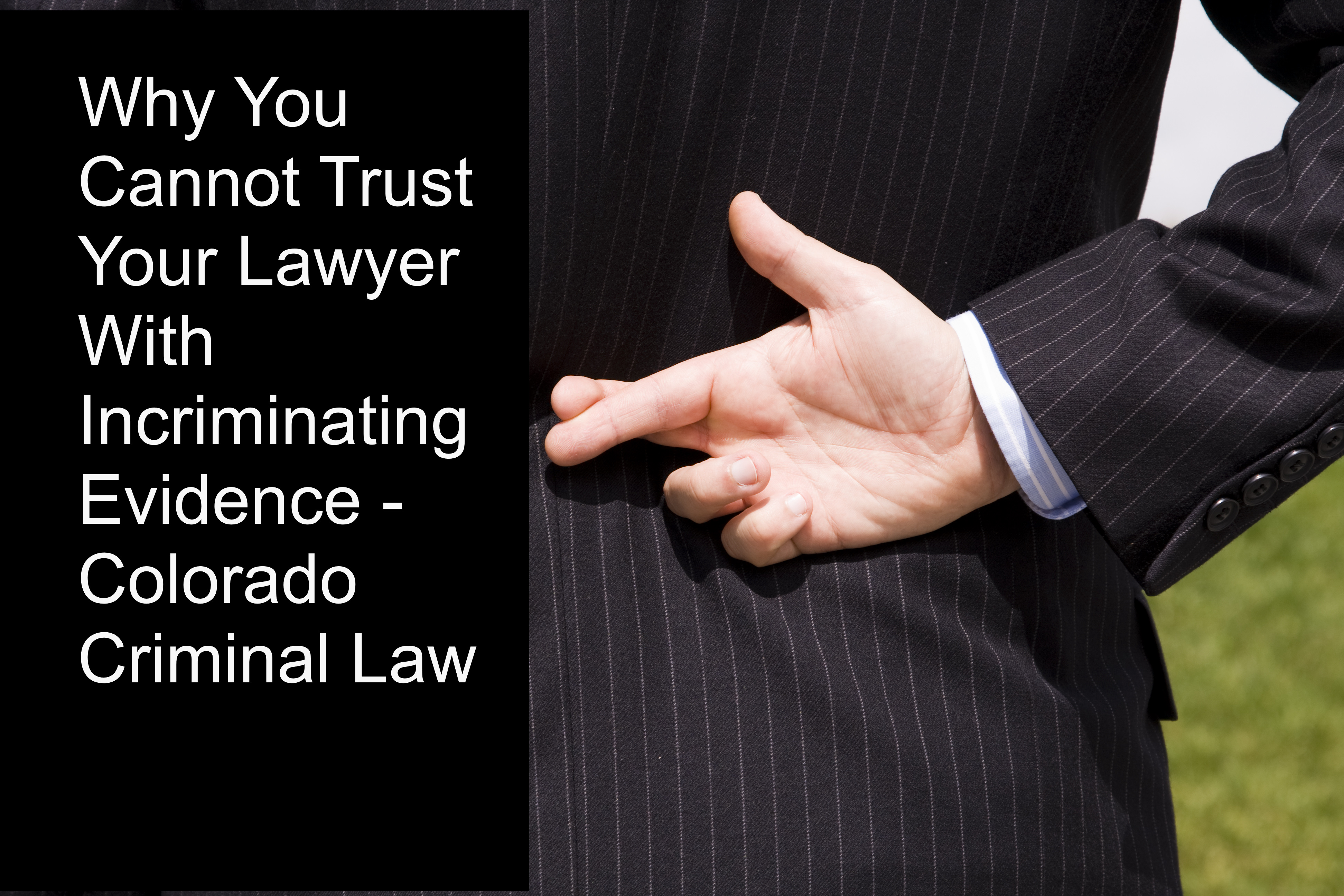
Other Articles of Interest:
- Sexual Assault On A Child By One In A Position Of Trust (18-3-405.3 (2)(b)) – Pattern of Abuse (18-3-405.3 (2)(d))
- Colorado Criminal Lawyer Series – When Can You NOT Trust Your Lawyer?
- Attacking The Investigation of Date – Acquaintance Sexual Assault – The Investigation – Part I of II
- Attacking The Investigation of Date – Acquaintance Sexual Assault – The Pretext Phone Call Part II of II
- Colorado State Sex Crimes Criminal Defense Issues
